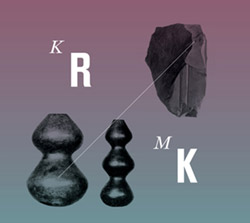
For many years, Keith Rowe has been on what amounts to a mission: how to deal with the saxophone, an instrument which doesn't easily lend itself to baggage-shedding, almost insisting on carrying a whiff of the idiomatic, in this case jazz. Brass instruments seem to have an easier time of it, musicians more readily able to abstract the emergent sound enough so as to preclude prior associations. In this regard, Rowe has worked in duo or trio settings with any number of saxophonists, from Evan Parker to John Butcher to Seymour Wright and more, resulting in greater or lesser degrees of "success", though often enough ending in some vaguely uncomfortable "compromise" area.
With Martin Küchen, he's found a partner who's up to the task. Küchen's own work, particularly his solo output, operates between at least two poles. One, which is fine and strong on its own, is an emotional, even Romantic but gritty and sour approach as heard on his "Hellstorm" (Mathka) and would not seem to be a conducive foil for Rowe. The other, however, reliant on extreme techniques and extraneous apparatus (including, as here, radio and iPod) is a very natural fit and works superbly.
There are two tracks, 21+ and 14 minutes, both beautifully recorded at Christoph Amann's studio in Vienna. The first begins darkly, very rich, several layers of electronics, radio and other clatter undergirded by some low baritone sax drones. The music attenuates and expands, almost like a vastly slowed down pulse, Küchen employing breath tones predominantly, Rowe sliding objects over his fret board, once picking up distorted baroque piano, generally keeping matters impressively grim. The pacing is excellent, a bleak landscape constantly unfurling before the listener's ears, imparting both a sense of intrepid exploration and overarching dystopian foreboding. Very, very fine. The second track begins with the most recognizable saxophone playing of the session, a low hum (on alto, I think) with breathy overtones, Rowe contributing rattles and billowy hums alongside. The music subsides into a territory more sparsely occupied than that heard on the preceding cut but also just slightly warmer, some soft, vaguely consonant tones throbbing in the distance, as if the landscape now contains some mammalian life, if not particularly friendly strains.
The Bakery is excellent, serious work, essential for anyone interested in the creations of either musician.
Comments and Feedback:
|



